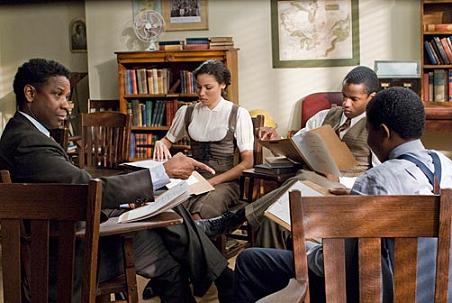
Consider the pedigree of The Great Debaters: directed by and starring Denzel Washington, one of our most respected actors; produced by Oprah Winfrey, Montecito resident and global entertainment brand; and featuring a favorite American narrative – that of the underdog triumphing over adversity and injustice. Combine all that with a Christmas Day release date, and it should come as no surprise to anyone that this is a feel-good movie. What makes this achievement remarkable is that the film is set during the depths of the Depression in the Jim Crow South, where the sense of humiliation and dread – of everyday disrespect, and violent disaster looming just ahead -i s palpable, even for the highly educated, relatively privileged African-Americans at the heart of the story.
The Great Debaters (which is based on historical events and figures) tells the story of Professor Melvin Tolson (Washington) and the debate team he coached to renown in 1935 at Wiley College, a small black college in Marshall, Texas – defeating teams from other black colleges first, and then taking on teams from white universities. Viewers will be relieved to learn, however, that the film does not resemble a two-hour presidential debate. Rather, the topics in the relatively brief debate scenes provide a means for the characters to speak passionately about subjects, such as welfare and the integration of higher education, that to them are not abstract academic arguments but issues with very real consequences in their lives. The film’s most obvious weakness is that the Wiley team is never shown having to argue in favor of a position that goes against the politics of Tolson, who’s considered a radical (and who, until the climactic contest against Harvard, writes all the team’s arguments). It might have been an awesome display of the Wiley squad’s rhetorical skill if it had been shown vanquishing its white opponents from Oklahoma arguing that blacks should not be admitted to state universities-but that would have been extremely discomfiting to the audience and not nearly as satisfying, so the Wiley team is depicted winning by arguing the affirmative, of course.
Nevertheless, the film surprises in pleasant ways. Washington has assembled a fine young ensemble, and for the most part, the members of the debate team are complex characters. Jurnee Smollett as Samantha, the only woman on the team (indeed, the only female debater on any of the teams shown competing), is particularly refreshing: a beautiful, ambitious young woman and fiery orator who feels no need to downplay her intelligence in front of men and even gets to enjoy a tryst with her impetuous teammate Henry (Nate Parker) without getting kicked out of school. Although John Heard plays an obligatory turn as the racist sheriff in town, the film makes clear that even in this time and place, blacks and whites could work together: One of the subplots has Tolson, at great personal and professional peril, trying to organize an integrated tenant farmers’ union.
The final showdown in Cambridge against national champions Harvard is suspenseful and satisfying, not least because it shows the team members on their own, without Tolson-having to overcome conflict and doubt, learning teamwork and selflessness. Ultimately, the most uplifting message of The Great Debaters is about the legacy passed from one generation to the next: impassioned young people learning the lessons of patience, generosity, and dignity from the older characters as they all struggle for justice.
For showtimes, check the Independent’s movie listings, here.

 on Google
on Google 

